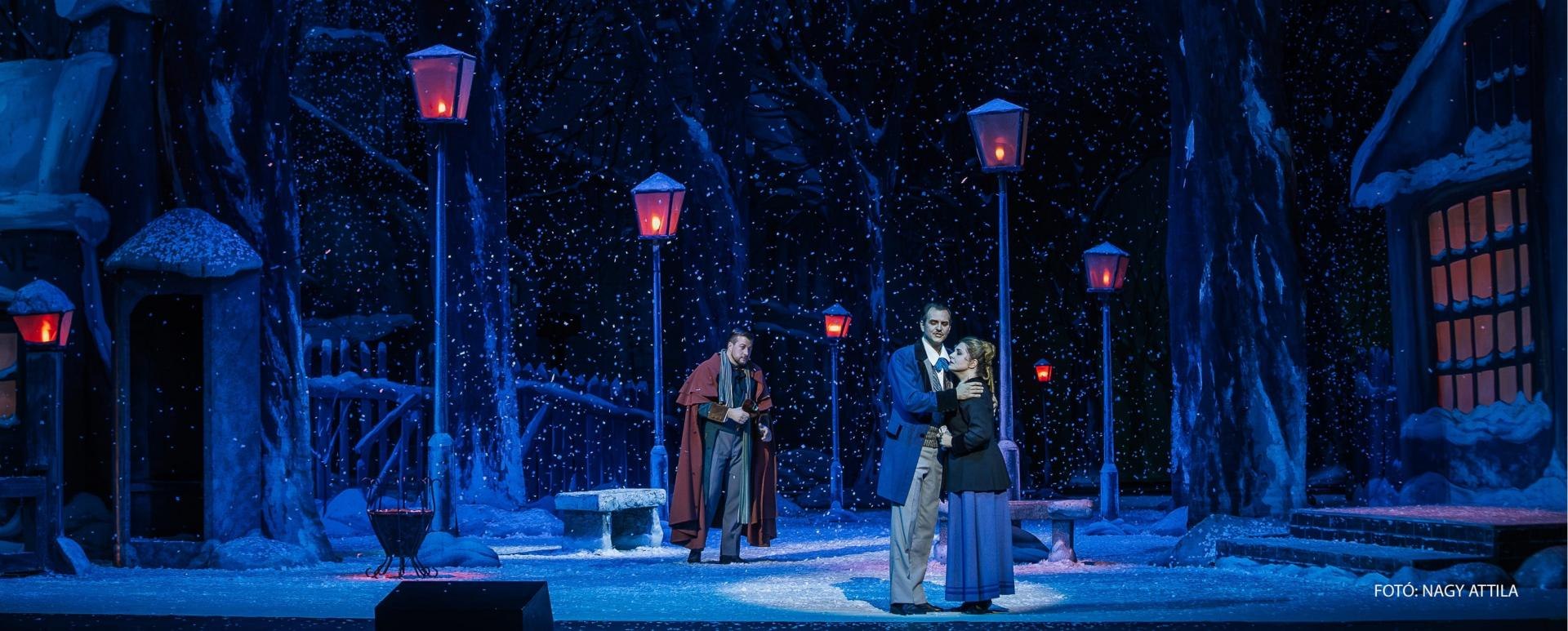La Bohème
Mo | Tu | We | Th | Fr | Sa | Su |
La bohème – Giacomo Puccini | Opera
Running time: 3 hours including, two intervals
Language: Italian
Surtitles: Hungarian, English, Italian
Some operas are legendary. None more so than Puccini's work telling the tale of young bohemians in Paris, in which one of the most beautiful romances in operatic literature begins with a burnt-out candle and a misplaced key.There are also legendary opera productions, such as this one directed by Kálmán Nádasdy. With Gusztáv Oláh's marvellous scenery, it is a genuine example of theatrical history that has remained on the Opera's programme calendar since 1937, with nearly 900 performances to date. Some things are timeless. This wonderful production is unquestionably one of them.
Age restriction: The performance is not recommended for children under 12 years of age.
Synopsis
Act I
Rodolfo and Marcello are freezing in their cold attic-room. Despite the poet throwing the manuscript of his play in the fire, the burning love scenes cannot exude enough heat. Colline arrives - with empty hands, as pawnshops are closed on Christmas Eve. Schaunard, however, brings money and delicious food. They divide the money, and eat ravenously. Unexpectedly, the landlord turns up to collect the unsettled rent, but soon they manage to get rid of him, and make their way to the café. However. Rodolfo has to write a poem first, so he follows his three friends later. Hardly has he got down to work when there is a knock at the door: Mimì is standing at the threshold. The wind has blown her candle out. The two hearts soon reconcile, and love starts to blossom in the small attic-room lit by the magical moonlight.
Act II
While a colourful crowd is whirling in the bustling streets, in Cafe Momus the four good friends and Mimì are celebrating Christmas Eve. Marcello's former love, Musetta appears with an elderly gallant, Alcindoro. She immediately seizes the opportunity to regain the painter's affection. With some clever acting, she loses the fooled gallant, and falls into Marcello's arms. As the bohemians have run out of money, when Alcindoro returns to the cafe he finds only the unsettled bill.
Act III
At a foggy and cold dawn near Barriére d'Enfer, in the outskirts of Paris. Mimì is looking for Marcello, who is living with Musetta in the tavern next door. She tells him of her grief: Rodolfo is continuously torturing her with his jealousy, and always suggests that they should separate. Both suffer terribly, and still cannot live without the other. Marcello promises to help them. Mimì walks off, but after some steps she hides behind a tree. Rodolfo steps out of the tavern, and after some hesitation he tells his friend the reason for his strange behaviour. He still passionately loves Mimi, as strongly as at the start, but the girl is fatally ill; she only has a chance to survive if they separate and Mimì finds someone who can provide more adequate living conditions. Mimì's loud weeping reveals her presence and that she has heard everything. Mimì and Rodolfo, both in tears, decide to remain together until the spring, while Musetta and Marcello start one of their usual quarrels.
Act IV
Rodolfo and Marcello are working in the attic-room again, or, rather, they would be working if their memories did not disrupt their imagination. They are both daydreaming about Mimì and Musetta. Schaunard arrives with Colline, and the mood brightens. When the high spirits are at their zenith, Musetta arrives suddenly: Mimì is coming. She has collected all her strength so she could die in the place where she used to be so happy. The two lovers are left alone, and they recall their first encounter. Then the bohemians and Musetta return one by one. When Colline, the last to arrive, closes the door, Mimì – silently, and almost unnoticeably – falls into an eternal sleep.
Program and cast
Conductor: Martin Rajna
Rodolfo - Andrei Danilov, Adorján Pataki, Gergely Boncsér
Schaunard - Azat Malik
Marcello - Csaba Sándor, Csaba Szegedi
Colline - Gábor Bretz
Mimì - Lilla Horti, Polina Pasztircsák
Musetta - Rita Rácz, Zita Szemere
Benoît - Dénes Gulyás
Alcindoro - Dénes Gulyás
Parpignol - Botond Pál (opera studio)
Featuring the Hungarian State Opera Orchestra, Chorus, and Children's Chorus
Giacomo Puccini / Giuseppe Giacosa / Luigi Illica
Director: Kálmán Nádasdy
Set designer: Gusztáv Oláh
Costume designer: Tivadar Márk
Hungarian translation by Éva Lax
English translation by Arthur Roger Crane
Assistant director: Sándor Palcsó
Head of the Children's Chorus: Nikolett Hajzer
Chorus director: Gábor Csiki
Hungarian State Opera
STANDING ROOM TICKETS - INFORMATION IN CASE OF A FULL HOUSE!
If all the seats are sold out for the selected time, but you still want to see the production on that day, 84 of the extremely affordable standing seats will be sold at the theatre, 2 hours before the start of the performance, with which you can visit the gallery on the 3rd floor. Tickets can be purchased at the ticket office of the Budapest Opera House. We would like to draw your attention to the fact that the stage can only be seen to a limited extent from the standing places and the side seats, but at the same time, following the performance is also supported by television broadcasting on the spot.
The Opera House is not only one of the most significant art relic of Budapest, but the symbol of the Hungarian operatic tradition of more than three hundred years as well. The long-awaited moment in Hungarian opera life arrived on September 27, 1884, when, in the presence of Franz Joseph I. the Opera House was opened amid great pomp and ceremony. The event, however, erupted into a small scandal - the curious crowd broke into the entrance hall and overran the security guards in order to catch a glimpse of the splendid Palace on Sugar út. Designed by Mikós Ybl, a major figure of 19th century Hungarian architecture, the construction lived up to the highest expectations. Ornamentation included paintings and sculptures by leading figures of Hungarian art of the time: Károly Lotz, Bertalan Székely, Mór Than and Alajos Stróbl. The great bronze chandelier from Mainz and the stage machinery moda by the Asphaleia company of Vienna were both considered as cutting-edge technology at that time.
Many important artists were guests here including Gustav Mahler, the composer who was director in Budapest from 1887 to 1891. He founded the international prestige of the institution, performing Wagner operas as well as Magcagni’ Cavalleria Rusticana. The Hungarian State Opera has always maintained high professional standards, inviting international stars like Renée Fleming, Cecilia Bartoli, Monserrat Caballé, Placido Domingo, Luciano Pavarotti, José Cura, Thomas Hampson and Juan Diego Flórez to perform on its stage. The Hungarian cast include outstanding and renowed artists like Éva Marton, Ilona Tokody, Andrea Rost, Dénes Gulyás, Attila Fekete and Gábor Bretz.

 EN
EN DE
DE IT
IT FR
FR ES
ES RU
RU JP
JP RO
RO
 Seating plan
Seating plan 